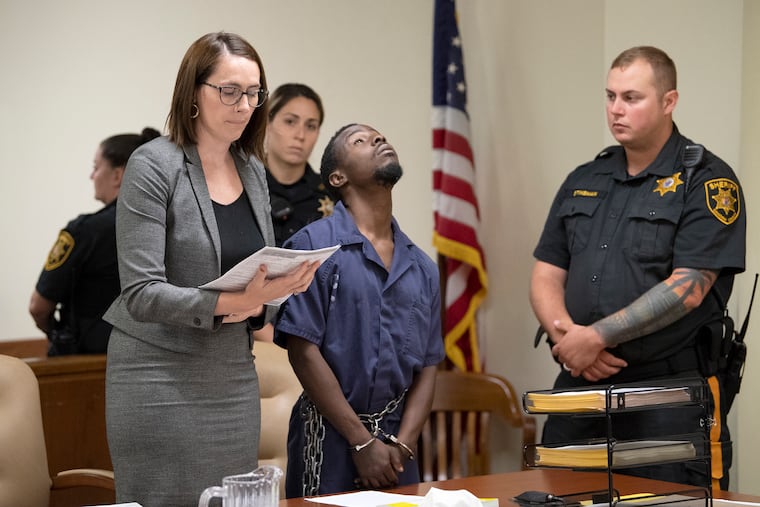Pennsylvania is the only state that doesn’t fund public defenders. That needs to change. | Opinion
When one side of the courtroom has all the money and resources, it isn’t a fair fight, and too many people spend too much time in jail.

Complex policy problems rarely have simple solutions. But when it comes to criminal justice reform in Pennsylvania, there is a simple solution that could have a direct, meaningful impact on the lives of the people — overwhelmingly poor, BIPOC — impacted by the criminal justice system every single day. This solution can reduce overincarceration, protect individuals against overaggressive police practices, and divert people from the criminal system.
The solution: Provide state funding for public defenders, the people fighting injustices in courtrooms across the commonwealth every single day.
When the government charges a person with a crime and puts them in a jail cell, the Constitution gives them the right to a lawyer. This is one of the founding principles of our country. In its 1963 landmark decision, Gideon v. Wainwright, the Supreme Court stated that it was an “obvious truth” that a poor person could not receive a fair trial without a lawyer. The court noted that “governments ... properly spend vast sums of money to establish machinery to try defendants accused of crime” and that those who are able “hire the best lawyers they can get to prepare and present their defenses.”
Unfortunately, policymakers have not taken the necessary steps to ensure that the right to counsel has meaning in the real world. Since 1963, vast sums of money and resources have been spent on one side of our adversarial system — law enforcement and prosecution. At the same time, the people on the other side of the system — and literally the other side of the courtroom — have been left behind. When a defendant cannot afford an attorney, they are appointed a public defender, who is paid by public funds. But public defender systems across the nation are chronically underfunded and understaffed. This lack of resources leads to predictable results — when one side of the courtroom has all the money and resources, it isn’t a fair fight, and low-income defendants who are represented by overburdened public defenders are more likely to be wrongfully convicted or receive longer sentences.
In a nation full of states that neglect this fundamental right, Pennsylvania is among the worst. Pennsylvania is the only state in the country that provides no state funding for public defenders. Currently, public defenders’ offices are funded solely by each of Pennsylvania’s 67 counties. This system has led to wide disparity in funding between counties; according to the American Civil Liberties Union of Pennsylvania, Philadelphia spends roughly nine times more on public defense per capita than Columbia County. In too many counties, public defenders are paid less than assistant district attorneys to handle heavy workloads with fewer support staff, including investigators and social workers. What’s more, there is no meaningful oversight of county public defenders to ensure that low-income people receive effective representation.
The Pennsylvania public defense system desperately needs change. The Public Defender Association of Pennsylvania (PDAP) recently circulated a proposal to Harrisburg legislators to create and fund an Indigent Defender Commission. Its full-time staff of experts from across the commonwealth would set statewide practice standards and distribute funding necessary to meet those standards. This approach maintains county input and funding for indigent defense while ensuring that the state fulfills its role in supporting this critical right contained in the Pennsylvania Constitution.
It’s difficult to estimate how much this might cost. But even a tiny fraction of the $2 billion they spend on state prisons each year will help provide an effective system of public defenders who can divert people away from prison, which may ultimately save money.
Reforming the public defense system is not partisan and should not be controversial. Politicians across the spectrum believe in constitutional principles and limiting the power of the government to infringe upon individual rights. The public understands that the decisions made in the criminal justice system are important. They want the system to be fair and know that fairness is impossible when one side has a lot more resources and power.
When the public, the politicians, and organizations from the right and left agree, there is no excuse for inaction. Sometimes simple solutions can be very effective. The Commonwealth of Pennsylvania should fund public defenders.
Christopher Welsh is the chief defender at the Delaware County Office of the Public Defender.